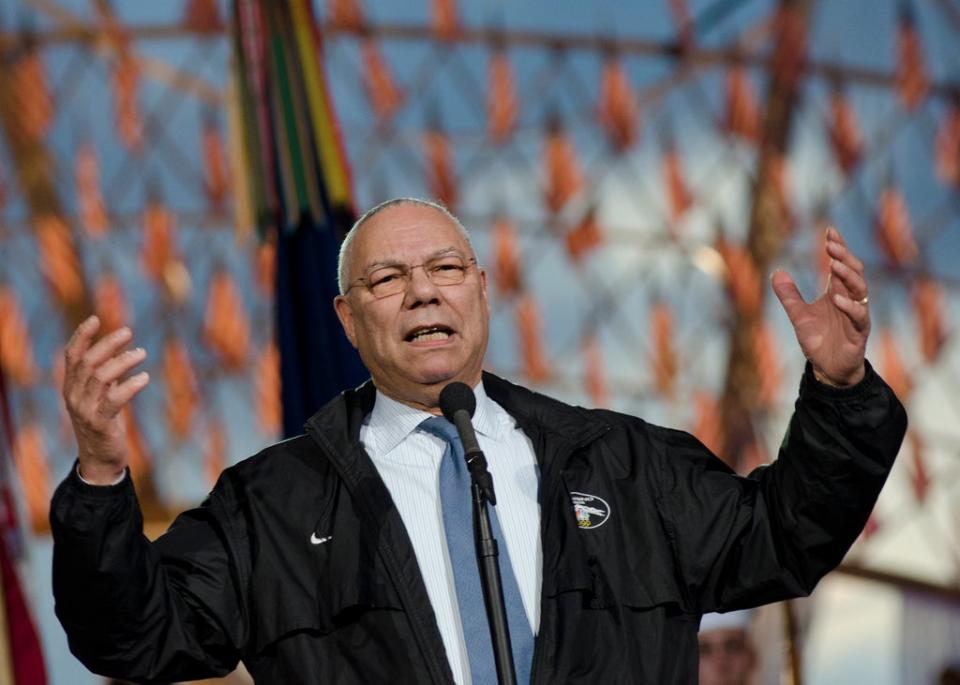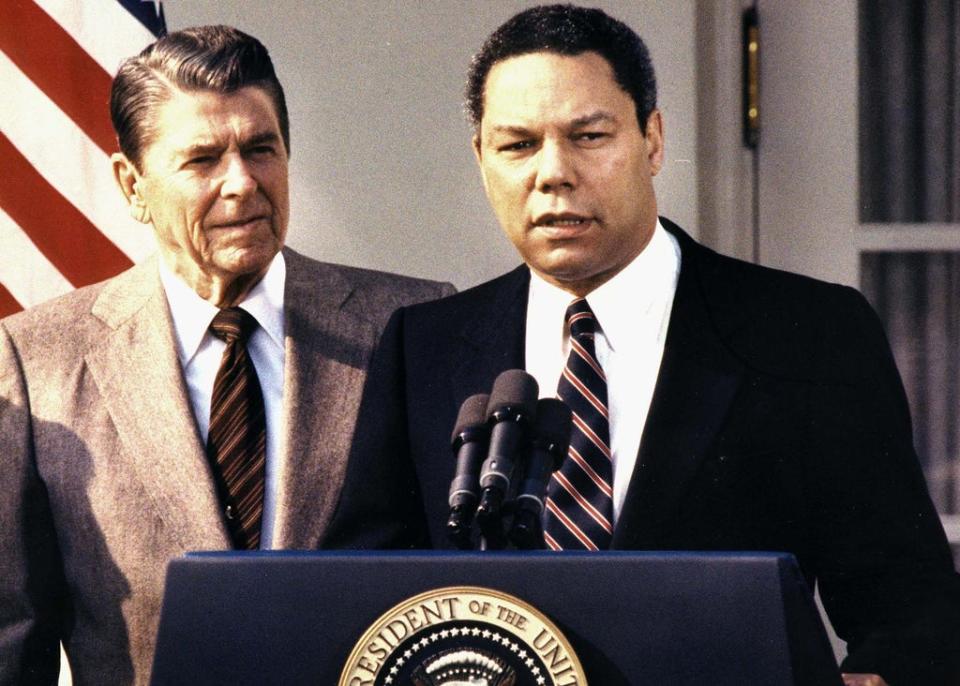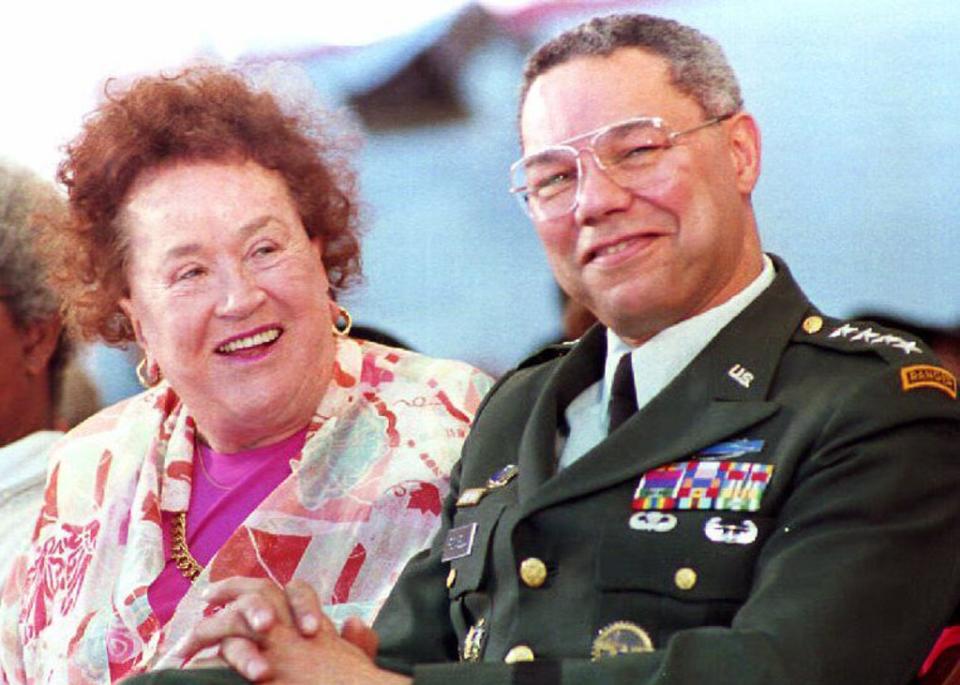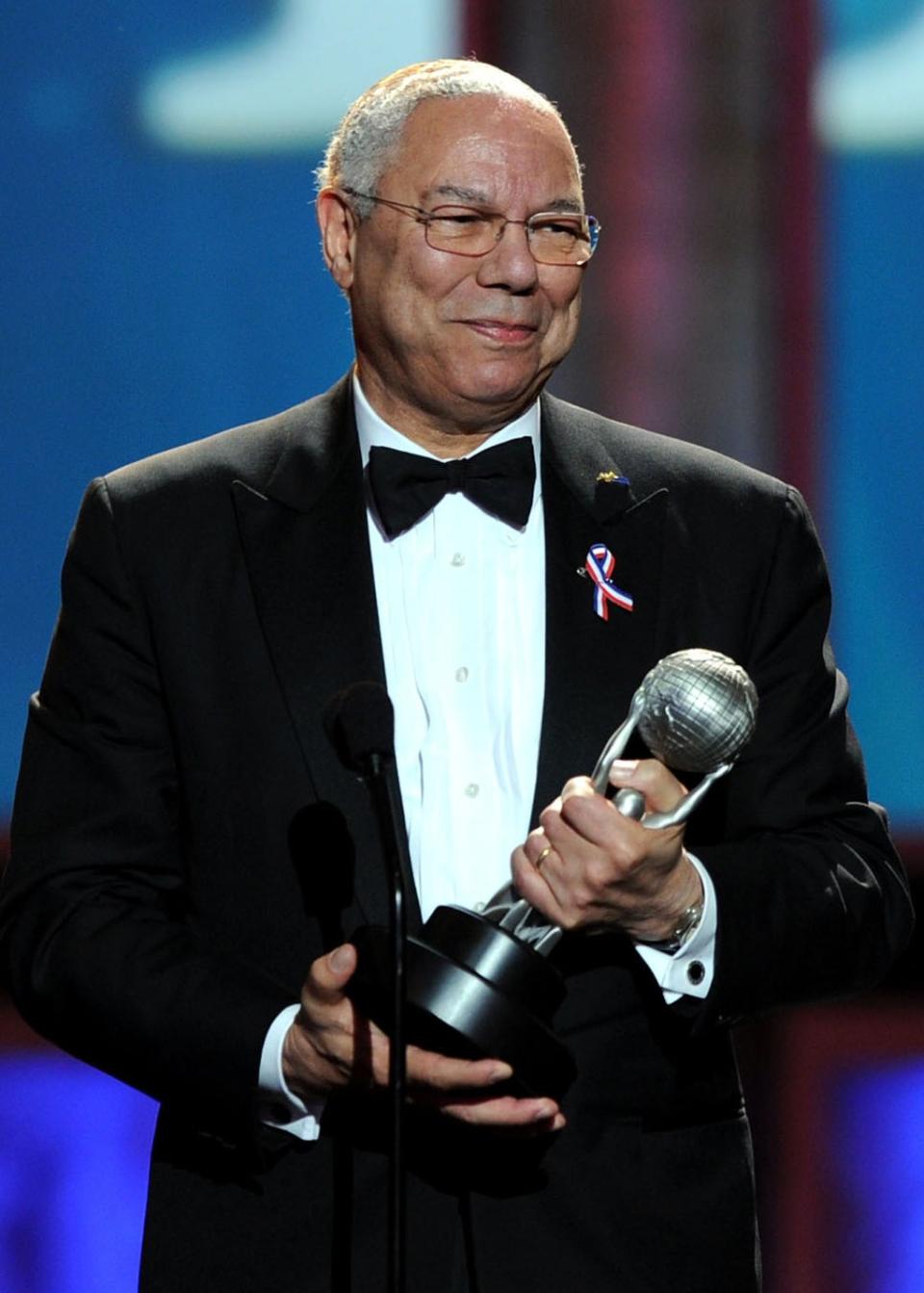Colin Powell: The beleaguered former secretary of state was ‘charming, articulate and skilled’
- Oops!Something went wrong.Please try again later.
- Oops!Something went wrong.Please try again later.
Colin Powell, who helped guide the U.S. military to victory in the 1991 Persian Gulf War as chairman of the Joint Chiefs of Staff, then struggled a decade later over the U.S. invasion of Iraq as a beleaguered secretary of state under President George W. Bush, has died 18th October at 84.
The cause was complications from Covid-19, his family said in a statement. He had been treated at Walter Reed National Military Medical Center in Bethesda, Md., his family added, noting he had been fully vaccinated.
Born in New York to Jamaican immigrants, Powell rose rapidly through the Army to become the youngest and first Black chairman of the Joint Chiefs. His climb was helped by a string of jobs as military assistant to high-level government officials and a stint as national security adviser to President Ronald Reagan. Charming, articulate and skilled at managing, he had a knack for exuding authority while also putting others at ease.
As the Pentagon's top officer, he played a prominent role in restoring a sense of pride to the nation's post-Vietnam military and began the reshaping of American forces after the end of the Cold War.
His famous prescription for the use of force, dubbed by journalists the Powell Doctrine, called for applying military might only with overwhelming and decisive troop strength, a clear objective and popular support.
His selection by President George W. Bush in late 2000 to be secretary of state transformed Powell from soldier to statesman and made him the first Black person to lead the State Department. But his four years as secretary proved his most difficult assignment.
A pragmatist and a strong believer in international alliances, Powell often found himself the odd man out in an administration dominated by neoconservative ideologues who were dubious about the usefulness of the United Nations and NATO and all too ready to employ U.S. military power.
Other than his well-known reservations about military intervention, Powell, as he often acknowledged, was not given to grand principles. He saw himself primarily as a problem-solver and expert manager.
Powell harboured deep misgivings about the timing of the 2003 invasion of Iraq and the size of the invading U.S. force. But he ultimately supported the action, lending his considerable credibility to making the public case for war. It was a move he later regretted.
While hailed on his retirement from public service at the end of Bush's first term as a figure of honour and distinction, Powell was also criticized for not pushing harder to block the Iraq War or quitting in protest.
In his defence, Powell cited a sense of duty and obedience to presidential authority. “It's just like in the military - you argue, you debate something, but once the president has made a decision, that becomes a decision for the Cabinet,” he said on CNN's “Larry King Live” in July 2009.

Bush had brought Powell into the Cabinet to lend immediate credibility and gravitas. But Powell's power and influence were frequently undercut by more hard-line colleagues, notably Vice President Dick Cheney and Defence Secretary Donald H. Rumsfeld, who viewed him at times as too solicitous of foreign interests and insufficiently supportive of Bush's vision for the muscular exercise of American power.
Powell was able to claim some victories early on. In his first year as secretary, he won the release from China of the crew of a U.S. surveillance plane that had made an emergency landing after colliding with a Chinese plane over the South China Sea, killing a Chinese pilot.
He averted the pull-out of U.S. troops from NATO peacekeeping operations in the Balkans, and he facilitated the U.S. withdrawal from the Anti-Ballistic Missile Treaty without provoking a harsh Russian backlash.
In other key foreign policy areas - among them, diplomacy with North Korea and efforts to ease Arab-Israeli tensions - Powell made little headway even inside the administration. Increasingly, he saw his mission as mainly moderating the more extreme tendencies of Bush's team and avoiding disaster.
Powell walked a thin line between blunt opinion and diplomatic reserve
“Serving as a brake on rash presidential actions and misguided policies was not the forward-looking role Powell had envisioned for himself as the nation's chief diplomat,” Washington Post journalist Karen DeYoung wrote in “Soldier,” her 2006 biography of Powell.
In the weeks after the Sept. 11, 2001, terrorist attacks, when the idea of attacking Iraq first arose, Powell helped persuade Bush to stay focused on striking al-Qaeda camps in Afghanistan.
Throughout 2002, Powell continued trying to slow the march to war with Iraq, warning Bush in a meeting in August that an invasion could destabilize the Middle East and shackle the United States with a great reconstruction burden.
“You break it, you own it,” he recalled saying.
But Powell eventually threw his substantial public credibility behind the decision to attack Iraq, agreeing to Bush's request to present the U.S. case for war to the U.N. Security Council in February 2003.
When Trump fomented a deadly insurrection at the U.S. Capitol on Jan. 6, 2021, Powell announced that he no longer considered the Republican Party his political home
His 75-minute speech, asserting that Iraq possessed chemical, biological and perhaps even nuclear weapons, proved deeply embarrassing when no weapons were found after the invasion. He told an interviewer several years later that the speech would remain a “blot” on his career, which was “painful” for him to accept.
Powell's bureaucratic battles within the administration persisted, and Bush, after winning re-election in 2004, asked for the secretary's resignation. “I left with some disappointment,” he said on Larry King's talk show, acknowledging that he had been “somewhat off frequency with” other Bush advisers.
The U.S.-led war and occupation dragged on for nearly a decade amid a grinding insurgency, caused thousands of American deaths and more than 100,000 Iraqi deaths, and left the United States mired in a failed state with hostile neighbours.
The costly war - in terms of lives and money - helped fuel a backlash against establishment Republican leaders that would contribute eventually to Donald Trump's outsider win in the 2016 presidential election.
Powell, who walked a thin line between blunt opinion and diplomatic reserve, was careful in 2008 not to publicly criticize Bush while announcing his support for Bush's Democratic successor, Barack Obama, the first Black president of the United States.

During Trump's tumultuous term in office, Powell became increasingly outspoken in his criticism of the president, who threatened and encouraged the use of force against racial-justice activists in 2020. He scorched Trump's ethics and accused other Republicans of accommodating or acquiescing to the president's divisiveness out of political self-interest.
“The one word I have to use with respect to what he's been doing for the last several years is the word I would never have used before, never would have used with any of the four presidents I worked for: He lies,” Powell said on CNN's “State of the Union” show. “He lies about things, and he gets away with it because people will not hold him accountable.”
When Powell announced his support for Democratic nominee Joe Biden over Trump in the 2020 election, Trump used the Iraq invasion as a cudgel, calling him “a real stiff who was very responsible for getting us into the disastrous Middle East Wars.”
And when Trump fomented a deadly insurrection at the U.S. Capitol on Jan. 6, 2021, after months of falsely claiming that Democrats had stolen the election, Powell announced that he no longer considered the Republican Party his political home. “Right now I'm just watching my country,” he said, “and not concerned with parties.”
Republicans, he told CNN, “would not stand up and tell the truth or stand up and criticize him or criticize others. And that's what we need. We need people who will speak the truth, who remember that they are here for our fellow citizens. They are here for our country. They are not here simply to be re-elected again.”
‘Many of my generation of Vietnam-era officers vowed that when our turn came to call the shots, we would not quietly acquiesce in half-hearted warfare for half-baked reasons that the American people could not understand’
Colin Luther Powell was born in New York's Harlem neighbourhood on April 5, 1937. His parents, Luther and Ariel, had emigrated from Jamaica in their 20s and found work in the garment district. In 1941, the family moved to the South Bronx, where Colin and his older sister, Marilyn, grew up in a multi-ethnic community of West Indian, Italian and Jewish immigrants.
After graduating from Morris High School in 1954, Colin studied geology at the City College of New York. His grades were mediocre, but he excelled in the Army's Reserve Officers' Training Corps, becoming leader of the precision drill team and achieving the top rank of cadet colonel.
Entering active-duty service in 1958, then-Lt. Powell first saw combat in Vietnam in 1963 as an adviser to a South Vietnamese infantry battalion patrolling the border with Laos.
Wounded after six months when he stepped on a punji trap - a bamboo spike hidden in the ground that pierced his foot - he spent the remaining months of his year-long tour at division headquarters in Hue.
Returning for a second year-long tour in mid-1968, and having risen to major, he served as operations officer at the headquarters of a support division and was injured again. This time he suffered a broken ankle in a helicopter crash landing. He was awarded the Soldier's Medal for going back into the smouldering aircraft to help rescue others still in it. His other decorations included the Legion of Merit, the Bronze Star Medal and two awards of the Purple Heart.

Like many young officers in Vietnam, Powell became convinced of the irrationality and futility of the war and came away with harsh judgments about how it was being fought and the damage done to Army morale and discipline.
“Many of my generation of Vietnam-era officers,” he wrote in his 1995 autobiography, My American Journey, “vowed that when our turn came to call the shots, we would not quietly acquiesce in half-hearted warfare for half-baked reasons that the American people could not understand.”
He missed his own chance early on to expose an especially egregious case of U.S. wrongdoing in Vietnam - the mass murder of unarmed Vietnamese civilians at My Lai in March 1968. Arriving in Vietnam three months after the massacre, Powell received a written complaint from a young soldier accusing U.S. forces of brutality against civilians.
The complaint did not refer specifically to My Lai, and after a cursory investigation, Powell dismissed the allegation of widespread abuses. It took a letter from another soldier months later for the Army to open a formal inquiry and for the facts of the massacre to emerge.
After earning an MBA at George Washington University in 1971, Powell won a prestigious White House fellowship, ending up in the Office of Management and Budget in the fall of 1972. The assignment introduced him to Caspar Weinberger and Frank Carlucci, two future defence secretaries who became important career patrons.
In 1973, Powell went back to the field to command an infantry battalion in South Korea, then studied for a year at the National War College. He took charge of a brigade of the 101st Airborne Division at Fort Campbell, Ky. But following the election of President Jimmy Carter, Powell was pulled back to Washington.
For four years, he held a series of assignments as military assistant to one high-level Pentagon official after another. During that period, he received his first general's star and became the Army's youngest brigadier general.
His promising career was nearly derailed soon after when he went to serve as a deputy to Maj. John Hudachek, commander of the 4th Infantry Division at Fort Carson, Colo. A notoriously irritable officer, Hudachek wrote an evaluation after one year that suggested that Powell was unfit for a more senior command assignment, describing him as an “aggressive” and merely “technically competent” officer.
Powell emerged as a driving force within the Pentagon for the downsizing and restructuring of U.S. forces after the dissolution of the Soviet-led Warsaw Pact. The U.S. invasion of Panama in December 1989 thrust him, outspoken and self-assured, into the spotlight
Several of Powell's higher-ranking admirers intervened, and in mid-1982, Powell was reassigned to Fort Leavenworth, Kan. By the end of the year, he had made the list of new two-star generals.
He returned to Washington in the summer of 1983 as military assistant to Weinberger, by then Reagan's secretary of defence. During that stint, he got embroiled in the Iran-contra scandal - the illegal, covert operation that involved selling arms to Iran to secure the release of American hostages in Lebanon and to raise funds for the right-wing rebel force in Nicaragua known as the contras.
Although Powell was never implicated in any wrongdoing, a subsequent investigation by independent counsel Lawrence Walsh faulted him for congressional testimony in 1987 that “was at least misleading” and “hardly constituted full disclosure” about whether Weinberger kept a diary or personal notes about the secret arms shipments.
As a result of his three years with Weinberger, Powell was able to skip over serving as a division commander and, in June 1986, went directly to the next higher level, assuming command of the Fifth Corps in Germany and gaining a third star.
Just six months later, however, he returned to Washington, this time at the urging of Carlucci, who had taken over as Reagan's national security adviser and wanted Powell to be his deputy. “When you get a person who is that astute, you want to use him in bigger things,” Carlucci once explained. When Carlucci replaced Weinberger as defence secretary in late 1987, Powell moved up to become national security adviser.
During his time on the National Security Council staff, Powell is credited with restoring credibility in the wake of the Iran-contra debacle. He helped end covert operations run by the NSC, fostered a culture of openness and introduced military-drill precision to meetings.
At the end of the Reagan administration, Powell briefly returned to the field as commander in chief of the Army Forces Command at Fort McPherson, Ga. The job brought him a fourth star. In the fall of 1989, President George H.W. Bush, at the strong urging of then-Defence Secretary Cheney, named Powell chairman of the Joint Chiefs of Staff.

Powell emerged as a driving force within the Pentagon for the downsizing and restructuring of U.S. forces after the dissolution of the Soviet-led Warsaw Pact. The U.S. invasion of Panama in December 1989 thrust him, outspoken and self-assured, into the spotlight. Showing off his talents as a briefer, he dominated news conferences and appeared clearly in charge at the Pentagon.
But it was the 1991 Persian Gulf War that made him a national hero. Initially, Powell had preferred to rely on sanctions to punish and contain Iraq after its troops invaded Kuwait. After Bush decided on military action, however, Powell pushed for a massive force to attack the Iraqi army.
“Our strategy to go after this army is very, very simple,” he declared at a news conference after the war's start in January 1991. “First, we're going to cut it off, and then we're going to kill it.” The much publicized line defined Powell as a cool, charismatic, tough-talking military leader.
“Credited (rightly or not) with having performed brilliantly during the successive interventions in Panama and the Persian Gulf, Powell by 1992 had become easily the most powerful JCS [Joint Chiefs of Staff] chairman in the history of that office,” defence analyst Andrew Bacevich wrote in his 2002 book “American Empire: the Realities and Consequences of U.S. Diplomacy.”
In later years, however, Powell, along with other senior administration officials, faced criticism for stopping the 1991 war after Kuwait was liberated, without advancing into Iraq and toppling Saddam Hussein. Concerned about images of U.S. pilots ruthlessly destroying retreating Iraqi units, Powell pushed to end the ground war before Iraq's military was entirely incapacitated.
Powell remained as Joint Chiefs chairman for the first eight months of President Bill Clinton's administration, although there were tensions. He challenged Clinton's campaign pledge to end the ban on gays serving in the military. And he resisted the desire of some Clinton administration officials to employ airstrikes in Bosnia to help protect Muslims from Serbian atrocities. He believed that limited airstrikes would do little to make the Serbs behave, and he worried about the lack of a clear political objective.
His reluctance prompted Madeleine Albright, then Clinton's ambassador to the United Nations, to ask him during one famous clash: “What's the point of having this superb military that you're always talking about if we can't use it?” Recounting the incident in his memoirs, Powell said, “I thought I would have an aneurysm.”
Shortly before stepping down as chairman, Powell did go along with the dispatch of additional Special Operations troops to Somalia to assist the hunt for clan leader Mohamed Farah Aideed, but his lingering reluctance to intervene was evident in his subsequent rejection of an appeal for armoured vehicles.
For much of his career, Powell avoided racial activism and tended to play down any portrayal of him as a symbol of Black achievement
On Oct. 3, 1993, three days after Powell retired, a firefight in Mogadishu left 18 U.S. soldiers dead. A Senate investigation later faulted Powell and Defence Secretary Les Aspin, finding that they had left American forces with insufficient protection by failing to send the armoured vehicles that had been requested.
The publication in 1995 of Powell's best-selling memoir, “My American Journey,” brought a new surge of interest in his political future. Despite his enormous popularity, though, right-wing GOP activists opposed a Powell candidacy. So did Powell's wife, the former Alma Johnson.
He and his wife had three children, Linda, Annemarie and Michael. Michael Powell, a lobbyist, served as Federal Communications Commission chairman under President George W. Bush. A complete list of survivors was not immediately available.
Powell eventually concluded that he didn't have sufficient enthusiasm for a presidential bid, and, in November 1995, he announced that he would not run. But he also stated his intention to work within the Republican Party to try to broaden its appeal.
It was the first time he had declared a party allegiance, reflecting a decision to try to moderate the GOP from within. Even so, Powell backed Obama for president in 2008, calling the senator from Illinois a “transformational figure.”
After retiring from public service, Powell spent much of his time on the lecture circuit. He also sought to help children and minorities in need through a non-profit organization he served as founding chairman called America's Promise. And he enjoyed tinkering in the garage, restoring old cars.
For much of his career, Powell avoided racial activism and tended to play down any portrayal of him as a symbol of Black achievement. Indeed, considerations of race factored much less in his professional success, he believed, than his ability to work within institutions, where he competed with Whites on their own terms.
“My race is somebody's else's problem,” he recalled telling himself when he left home for the Army. “It's not my problem.”
© The Washington Post
Read More
Sir David Amess: MP of conviction and animal rights champion

